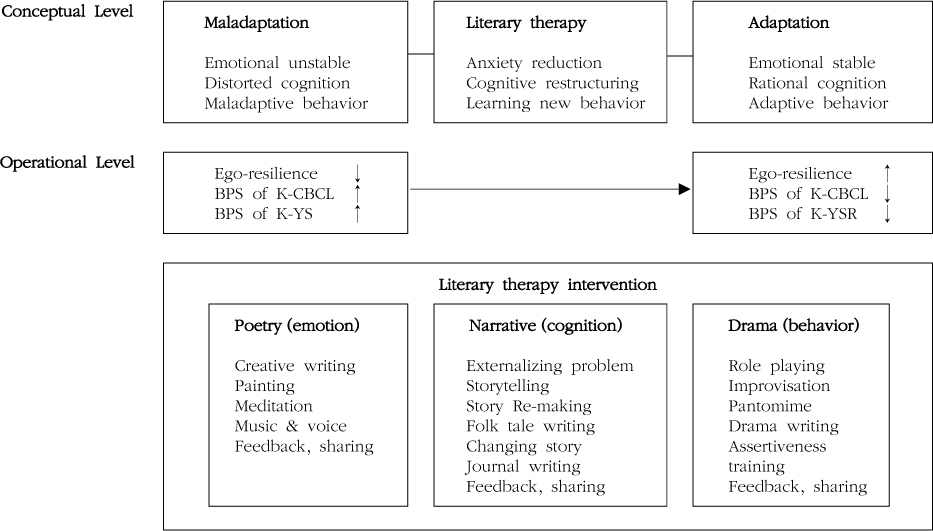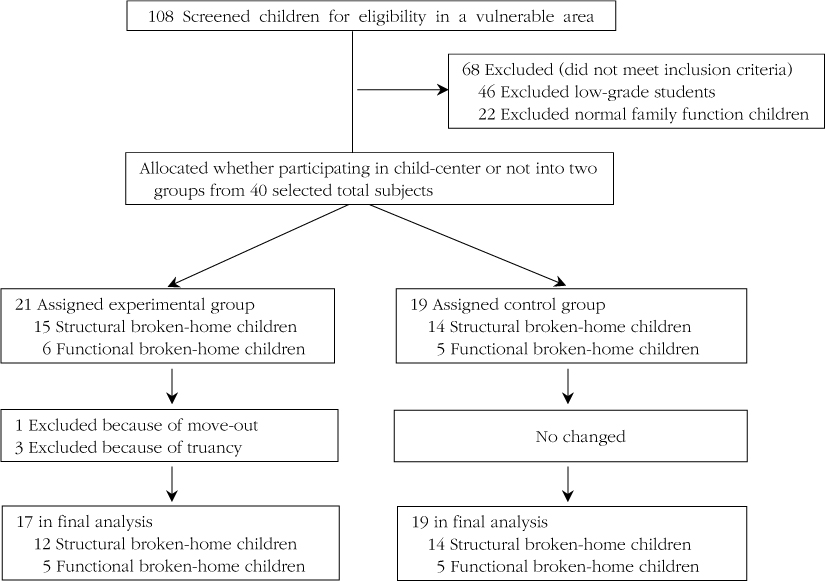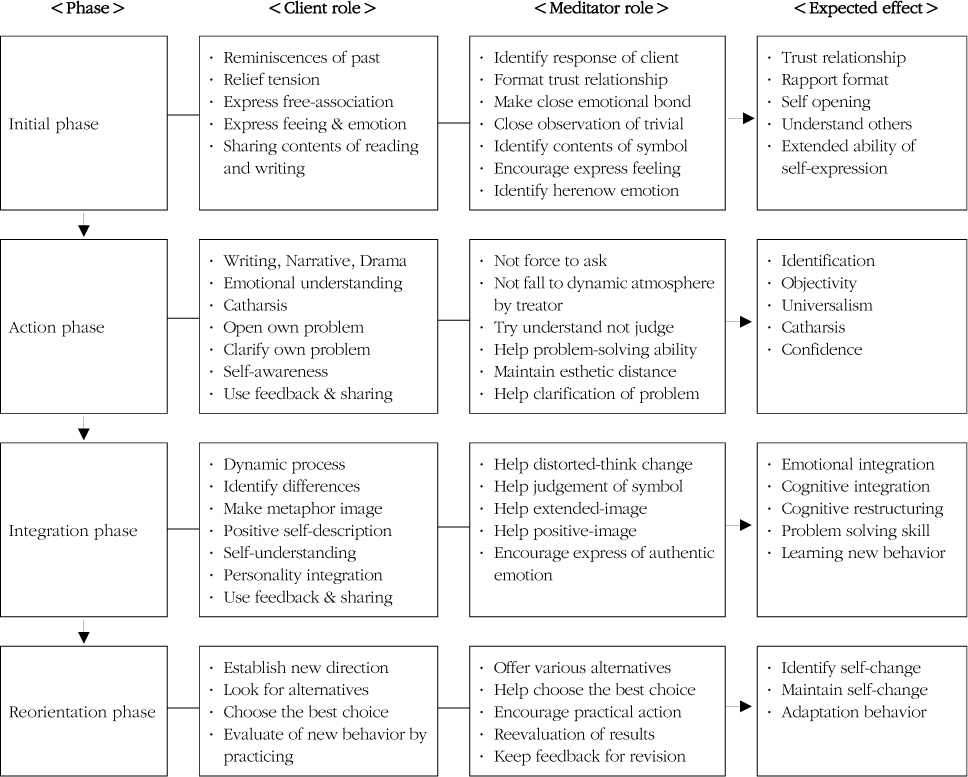J Korean Acad Psychiatr Ment Health Nurs.
2011 Jun;20(2):143-156. 10.12934/jkpmhn.2011.20.2.143.
Effects of Literary Therapy Intervention on Ego Resilience and Maladaptive Behavior in Children of Broken Homes
- Affiliations
-
- 1College of Nursing, Kyungpook National University, Korea. wanJupark@knu.ac.kr
- KMID: 2321893
- DOI: http://doi.org/10.12934/jkpmhn.2011.20.2.143
Abstract
- PURPOSE
This study was done to examine the effects of a literary therapy intervention on ego-resilience and maladaptive behavior among children of broken homes.
METHODS
The intervention consisted of 16 sessions designed to achieve a positive self-concept and was constructed as an interaction between participant and certain literature including poetry, narratives, dramas, art therapy, and willingness to share it with others. The study was carried out from May 2 to July 25, 2006. The participants were 36 children resided in a vulnerable region in G city. The collected data for Ego-resilience, Korean-Children Behavior Checklist (K-CBCL), Korean-Youth Self-Report (K-YSR) were respectively analyzed using descriptive statistics, t-test, repeated measures ANOVA with Post Hoc, and ANCOVA with the SPSS/WIN version 12.0 program.
RESULTS
After the intervention, there was a significant difference between the experimental and the control group for Ego-resilience, K-CBCL, and K-YSR. There were significant differences according to time process in ego-resilience and K-YSR.
CONCLUSION
The results indicate that literary therapy is an effective nursing intervention for enhancing ego-resilience and reducing maladaptive behavior in children of broken homes.
Figure
Cited by 1 articles
-
Effects of Ego-resilience Interventions among Children and Adolescents in Korea: A Meta-analysis
Sun-A Jung, Kowoon Lee
J Korean Acad Psychiatr Ment Health Nurs. 2016;25(3):237-248. doi: 10.12934/jkpmhn.2016.25.3.237.
Reference
-
1. Achenbach TM. Manual for the child behavior checklist/4-18 and 1991 profile. Burlington, VT: Dept. of Psychiatry, University of Vermont;1991.2. Block J, Kreman AM. IQ and ego-resiliency: Conceptual and empirical connections and separateness. J Pers Soc Psychol. 1996; 70:349–361.
Article3. Byun HS. Integrative poetry & bibliotherapy. Seoul: Hakjisa;2006.4. Byun HS, Chae YS, Kim CK. Biblio/poesie therapie fur angststorungen. Büchner Und Mod Lit. 2008; 30:327–352.5. Conger JJ, Peterson AC. Adolescent and youth. New York: Harper & Row Publishers;1984.6. Cornett CE, Cornett CF. Bibliotherapy: The right book at the right time. Indiana: Bloomington;1980.7. Garmezy N. Vulnerability and resilience. In : Funder DC, Parke RD, Tomlinson-Keasey C, Widaman K, editors. Studying lives through time. Washington, DC: American Psychological Association;1993.8. Gladding ST, Gladding C. The ABCs of bibliotherapy for school counselors. Sch Counselor. 1991; 39(1):7–13.9. Ha EH, Lee SJ, Oh GJ, Hong GE. Parentadolescent agreement in the assessment of behavior problems of adolescents(Comparison of factor structures of K-CBCL and YSL). J Child Adolesc Psychiatry. 1998; 9(1):3–12.10. Hynes AM, Hynes-Berry M. Bibliotherapy-the interactive process: A handbook. Boulder, CO: Westview;1986.11. Hyun MS, Kim MA. The effects of the cognitive-behavioral therapy on depression and self efficacy of the problem behavior adolescents in middle school. J Korean Acad Psychiatr Ment Health Nurs. 2004; 18:458–466.12. James RK, Gilliland BE. Crisis intervention strategies. 4th ed. Pacific Grove, CA: Brooks/Cole;2001.13. Kim CK, Chae YS, Byun HS. The effects of integrative literary therapy program on the anxiety reduction and self-esteem improvement of children. J Emot Behav Disord. 2009; 25(2):57–76.14. Kim GS, Kim YG. The effects of self-growth group counseling on the adaptation of broken-home students to school life adjustment and their problematic behaviors. J Humanit. 2002; 7:1–29.15. Kim JA, Hwang HJ. A study about effect of literary therapeutic program through the case of children. J Lit Ther. 2010; 14:95–139.16. Kim TK. The effect of structured bibliotherapy on psychiatric inpatients' behavior and their prognosis. Seoul: Seoul National University;1984. Unpublished master's thesis.17. Kook ES. The case study of literary therapy for maladjusted children. Jeonbook: Woosuk University;2003. Unpublished master's thesis.18. Korean Statistical Information Service (KOSIS). DT-1EU338. 2005. Retrieved May 28, 2011. from http://kosis.kr/winsearch/totalSearch.jsp.19. Korean Statistical Information Service (KOSIS). DT-1B8000F. 2010. Retrieved May 28, 2011. from http://kosis.kr/winsearch/totalSearch.jsp.20. Kramer PA, Smith GC. Easing the pain of divorce through children's literature. Early Child Educ. 1998; 26(2):89–94.21. Lee EG. Emotional & behavioral problems in children from broken family. Fam Environ Res. 2004; 42:191–204.22. Manassis K, Bradley S, Goldberg S, Hood J, Swinson L. Behavioural inhibition, attachment and anxiety in children of mothers with anxiety disorders. Can J Psychiatry. 1995; 40:87–92.
Article23. Moon MY. The effects of children's perception of parental rising attitude on children's behavior of maladjustment. Seoul: Yonsei University;2000. Unpublished master's thesis.24. Oh KJ, Ha EH, Lee HR, Hong GE. K-YSR, Korean-youth self report. Seoul: Chungang Aptitude Publishing;1997.25. Park EH. The relationships between ego-resiliency, IQ and academic achievement. Daejeon: Chungnam National University;1996. Unpublished master's thesis.26. Park JJ. Comparison of the results of the K-CBCL and the K-YSR on emotional and behavioral problems of adolescents in Jejudo. Gwangju: Chosun University;2002. Unpublished master's thesis.27. Park WJ. The influence of ego-resilience on critical thinking dispositions, learning styles, and academic adjustment in nursing students. J Korean Acad Psychiatr Ment Health Nurs. 2009; 18:240–250.28. Richman N, Steavenson J, Graham PJ. Pre-school to school: A behavioural study. London: Academy Press;1982.29. Yalom ID. The theory and practice of group psychotherapy. New York: Basic Books;1985.30. Yoo SG, Hong SH, Choi BY. Mediating effects of ego-resilience, attachment, and existential spirituality between family risks and adaptation. Korean J Educ Psychol. 2004; 18:393–408.31. Yoon HM, Park BK. Factors associated with adolescents' problem behaviors. Korean J Soc Welf Stud. 2005; 28:133–164.32. Yun MY. A study on literary therapy of children's ADHD. J Lit Ther. 2008; 9:179–226.
- Full Text Links
- Actions
-
Cited
- CITED
-
- Close
- Share
- Similar articles
-
- Effects of Ego-resilience Interventions among Children and Adolescents in Korea: A Meta-analysis
- University Students' Health Behavior, Depression, and Ego-resilience
- Influence of Parents' Rearing Attitudes Perceived by Bullied Children on Bullying: Ego-Resilience Mediation
- The Influence of Parental Behavior on Ego Resilience of Korean Middle School Student
- The Effects of Empathy on Interpersonal Relationship through the Mediating Effect of Ego-resilience in Nursing Students





